WTO法律制度案例.ppt
- 格式:ppt
- 大小:227.01 KB
- 文档页数:17
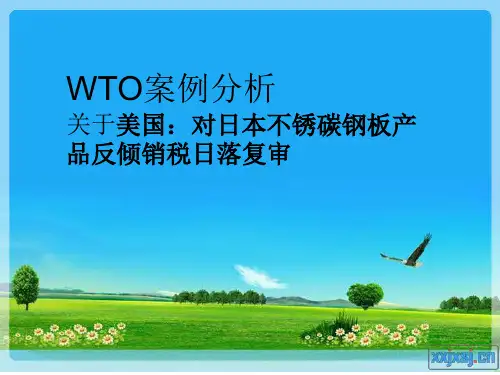
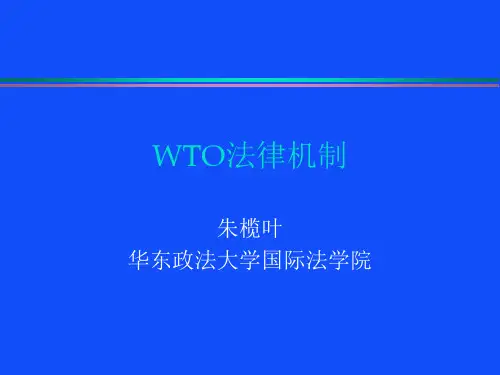
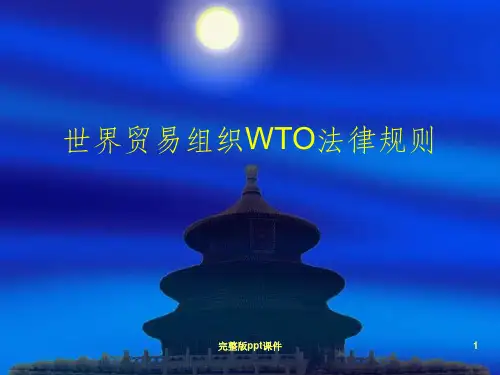
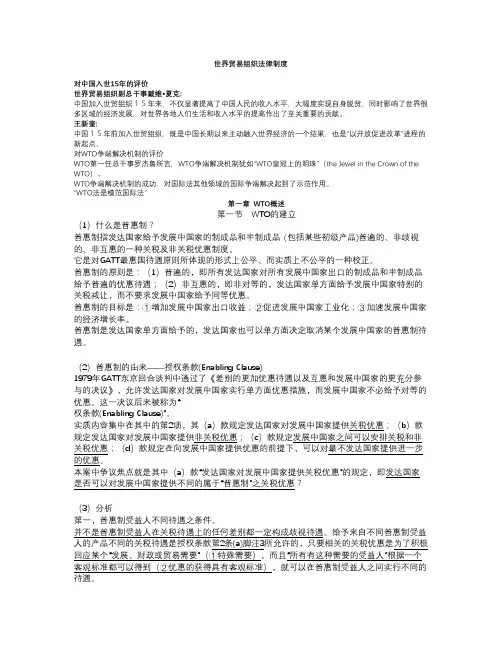
世界贸易组织法律制度对中国入世15年的评价世界贸易组织副总干事戴维•夏克:中国加入世贸组织15年来,不仅显著提高了中国人民的收入水平,大幅度实现自身脱贫,同时影响了世界很多区域的经济发展,对世界各地人们生活和收入水平的提高作出了至关重要的贡献。
王新奎:中国15年前加入世贸组织,既是中国长期以来主动融入世界经济的一个结果,也是“以开放促进改革”进程的新起点。
对WTO争端解决机制的评价WTO第一任总干事罗杰鲁所言,WTO争端解决机制犹如“WTO皇冠上的明珠”(the Jewel in the Crown of the WTO)。
WTO争端解决机制的成功,对国际法其他领域的国际争端解决起到了示范作用。
“WTO法是模范国际法”第一章WTO概述第一节WTO的建立(1)什么是普惠制?普惠制指发达国家给予发展中国家的制成品和半制成品(包括某些初级产品)普遍的、非歧视的、非互惠的一种关税及非关税优惠制度。
它是对GATT最惠国待遇原则所体现的形式上公平、而实质上不公平的一种校正。
普惠制的原则是:(1)普遍的,即所有发达国家对所有发展中国家出口的制成品和半制成品给予普遍的优惠待遇;(2)非互惠的,即非对等的,发达国家单方面给予发展中国家特别的关税减让,而不要求发展中国家给予同等优惠。
普惠制的目标是:①增加发展中国家出口收益;②促进发展中国家工业化;③加速发展中国家的经济增长率。
普惠制是发达国家单方面给予的,发达国家也可以单方面决定取消某个发展中国家的普惠制待遇。
(2)普惠制的由来——授权条款(Enabling Clause)1979年GATT东京回合谈判中通过了《差别的更加优惠待遇以及互惠和发展中国家的更充分参与的决议》,允许发达国家对发展中国家实行单方面优惠措施,而发展中国家不必给予对等的优惠。
这一决议后来被称为“权条款(Enabling Clause)”。
实质内容集中在其中的第2项,其(a)款规定发达国家对发展中国家提供关税优惠;(b)款规定发达国家对发展中国家提供非关税优惠;(c)款规定发展中国家之间可以安排关税和非关税优惠;(d)款规定在向发展中国家提供优惠的前提下,可以对最不发达国家提供进一步的优惠。
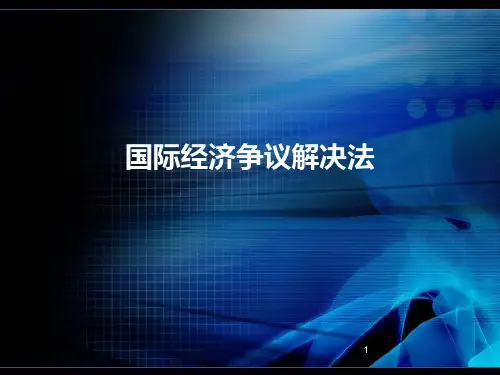
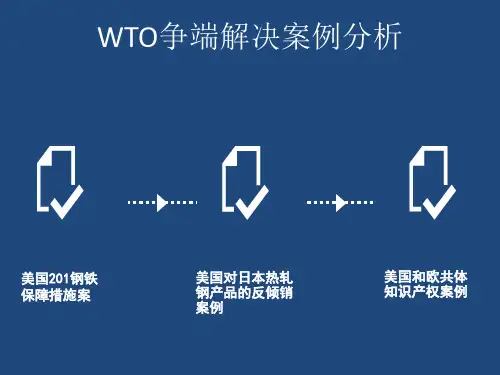


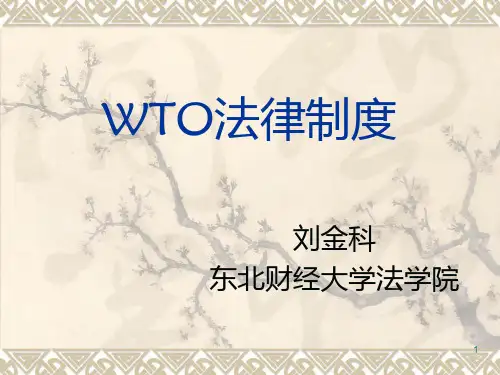
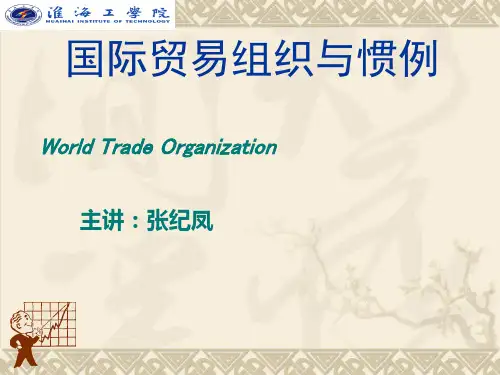
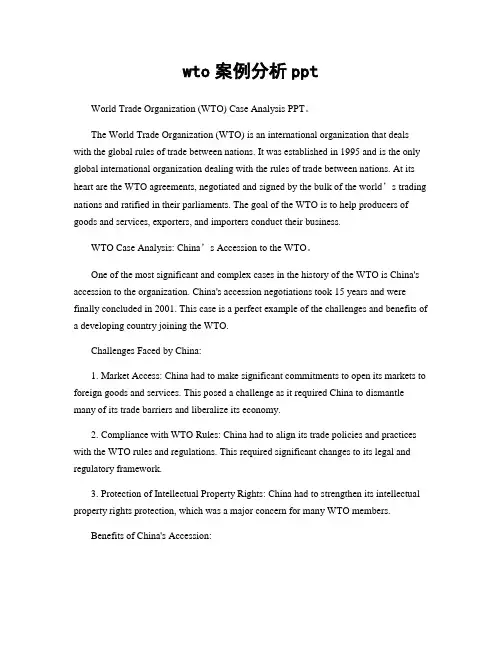
wto案例分析pptWorld Trade Organization (WTO) Case Analysis PPT。
The World Trade Organization (WTO) is an international organization that deals with the global rules of trade between nations. It was established in 1995 and is the only global international organization dealing with the rules of trade between nations. At its heart are the WTO agreements, negotiated and signed by the bulk of the world’s trading nations and ratified in their parliaments. The goal of the WTO is to help producers of goods and services, exporters, and importers conduct their business.WTO Case Analysis: China’s Accession to the WTO。
One of the most significant and complex cases in the history of the WTO is China's accession to the organization. China's accession negotiations took 15 years and were finally concluded in 2001. This case is a perfect example of the challenges and benefits of a developing country joining the WTO.Challenges Faced by China:1. Market Access: China had to make significant commitments to open its markets to foreign goods and services. This posed a challenge as it required China to dismantle many of its trade barriers and liberalize its economy.2. Compliance with WTO Rules: China had to align its trade policies and practices with the WTO rules and regulations. This required significant changes to its legal and regulatory framework.3. Protection of Intellectual Property Rights: China had to strengthen its intellectual property rights protection, which was a major concern for many WTO members.Benefits of China's Accession:1. Economic Growth: China's accession to the WTO has significantly boosted its economic growth. It has become a major player in global trade and has benefited from increased market access to other WTO member countries.2. Foreign Direct Investment: China's accession has attracted a significant amount of foreign direct investment. This has contributed to the modernization and development of its economy.3. Integration into the Global Economy: China's accession has facilitated its integration into the global economy. It has become a key player in international trade and has benefited from the transfer of technology and know-how from other WTO members.Lessons Learned:1. Patience and Persistence: China's accession to the WTO required patience and persistence. It involved lengthy negotiations and the willingness to make significant reforms to its economy.2. Adherence to Rules-Based Trade: China's accession demonstrates the importance of adhering to rules-based trade. It has helped China to become a responsible and active participant in the global trading system.3. Balancing National Interests with Global Commitments: China had to strike a balance between its national interests and its commitments to the WTO. This required careful navigation and strategic decision-making.In conclusion, China's accession to the WTO is a significant case that highlights the challenges and benefits of a developing country joining the organization. It has demonstrated the importance of patience, adherence to rules-based trade, and the need to balance national interests with global commitments. China's experience provides valuable lessons for other developing countries considering joining the WTO.。